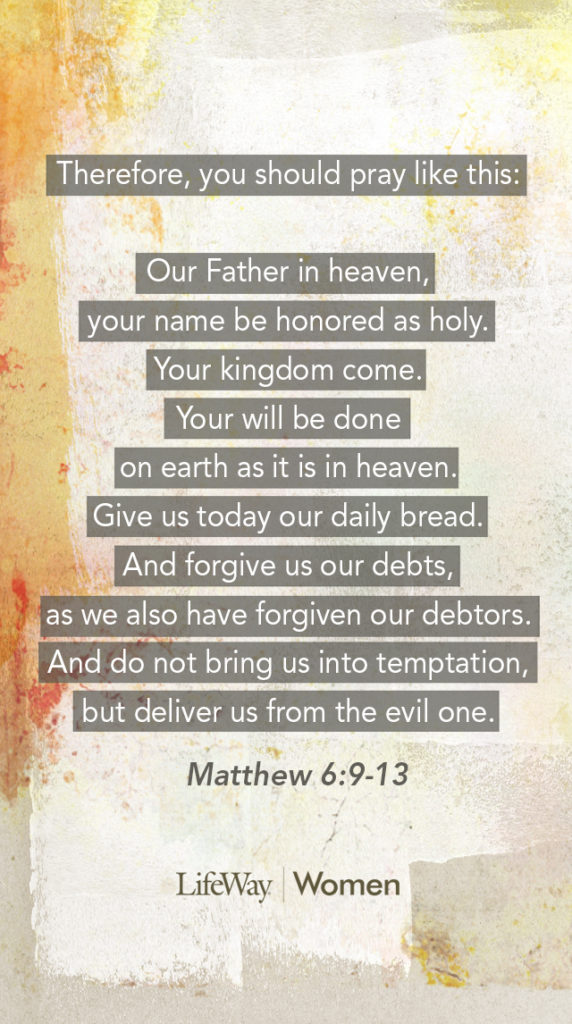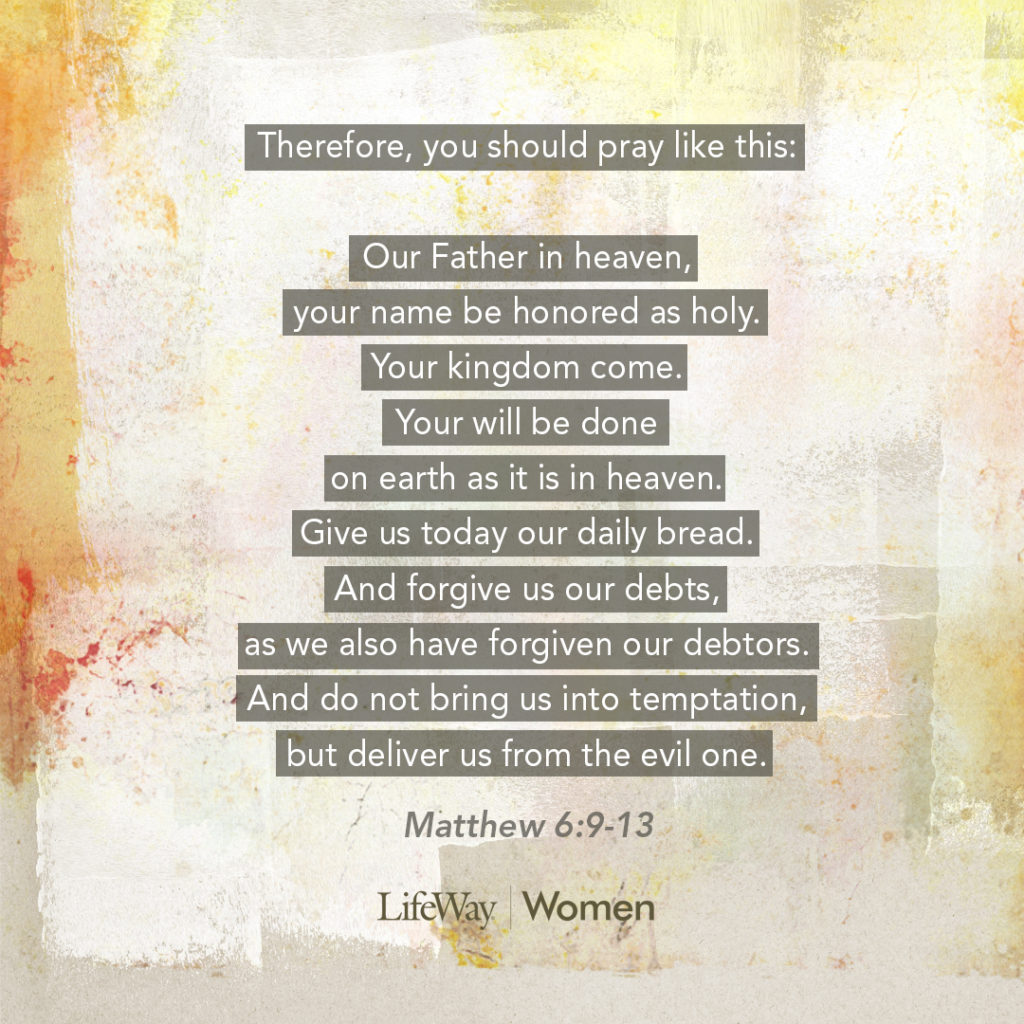Are you ready for fall? Whether you’re a fan of new school supplies, falling leaves, and pumpkin-themed everything, or you prefer the long, warm days of summer, there is one thing most of us can agree on: We should anticipate the fall season and welcome it with prayer.
With that in mind, our team came together to create a seven-day prayer guide for fall. This guide can be used throughout the fall season (and beyond) as we join together and follow Jesus’ example of how to pray. Together, we will spend seven days walking through Matthew 6:5-15, The Lord’s Prayer.
Each day will be broken down into four parts: Pause. Rejoice. Ask. Yield.
(We borrowed this idea from Pete Greig’s book, How to Pray.)
As we enter this season of prayer for the fall season we want to encourage you to take a moment to pause and reflect on Jesus’ words from Matthew 6:5-9a (CSB):
Whenever you pray, you must not be like the hypocrites, because they love to pray standing in the synagogues and on the street corners to be seen by people. Truly I tell you, they have their reward. But when you pray, go into your private room, shut your door, and pray to your Father who is in secret. And your Father who sees in secret will reward you. When you pray, don’t babble like the Gentiles, since they imagine they’ll be heard for their many words. Don’t be like them, because your Father knows the things you need before you ask him.
Therefore, you should pray like this:
Day One: “Our Father in heaven” (Matt. 6:9)
Pause: “Our Father in heaven.” As Jesus began the Lord’s Prayer, He chose to acknowledge that the entire prayer should be a pattern for our prayer life. And what better way to begin prayer than by acknowledging who we are praying to—our heavenly Father? The Greek word for father in this verse is patēr, a pronoun Jesus used to unite Himself with the Father as one who would be intimately acquainted with God’s purpose and as one appointed to carry out the plan of salvation.1 The Aramaic form, the language Jesus would have spoken, is Abba, a term of endearment and accessibility, something those in the first century had not considered regarding their relationship to God.2 In this first phrase, we are reminded of our relationship to God the Father and also of His sovereign rule over everything.
Rejoice: Praise God by acknowledging who God is; praise Him for His attributes and that you have access to Him through Jesus Christ.
Ask: For many people, the term father doesn’t always conjure up good memories. Maybe you had a loving earthly father who not only showed love in his words but in his actions. On the other hand, maybe you weren’t raised by a loving father. Because of your past, the image of a father is a reminder of pain or neglect. If that is your story, ask the Lord to be the Father you didn’t have. Ask Him to reveal Himself through Scripture so you can see all the marvelous attributes of our heavenly Father—that He is good; He is faithful, and He values you.
Yield: If you had a good example of an earthly father, be thankful for this gift and ask the Lord to help you have compassion for those who struggle with this term. Read Romans 8:15-17 and acknowledge your spiritual adoption and our ability to cry out to our Abba Father in our times of need.
Day Two: “your name be honored as holy” (Matt. 6:9)
Pause: “your name be honored as holy.” Some translations, perhaps the one you have memorized, use the word hallowed instead of holy. We typically don’t use either word outside of “church talk” anymore, but they mean the same thing. Holy means to be set apart, to be righteous, pure, wholly other. Meditate on the fact that we serve a God who is completely other than us (and that’s a good thing!). He is righteous, pure, set apart.
Rejoice: Praise God for His holiness. Pray with the creatures in Revelation 4:8, “Holy, holy, holy, Lord God, the Almighty, who was, who is, and who is to come.” Thank Him for being a God who is different from you—for His righteousness and purity.
Ask: The CSB Study Bible notes that this part of the Lord’s Prayer demonstrates an expectation of Jesus for His disciples.3 He expected them to live righteous lives that honored God’s name. This isn’t simply something we say, but what we do. As Christ-followers, we represent the holy God to the world. Ask God to help you be a true representative of Him to others. Ask Him to continue sanctifying you toward holiness and to help you reflect Him in word and in deed.
Yield: Take a moment to read Psalm 96:1-9. Worship God through the reading of His Word and praying Scripture back to Him.
Day Three: “Your kingdom come. Your will be done” (Matt. 6:10)
Pause: “Your kingdom come. Your will be done.” How many of us spend our days hustling and striving to build our own kingdoms? In this phrase of the Lord’s Prayer, Jesus reminded us that the longing of our hearts should be for the expansion of God’s kingdom, not our own. When we pray these words, we’re not granting permission for God’s kingdom to come; we’re affirming the eternal reality that Jesus alone is King of kings and Lord of lords (Rev. 19:11-16) and that we lay down our own will so that His will can be accomplished in our lives.
Rejoice: Reflect on the goodness of living under the rule and reign of a God whose love is steadfast. Bow humbly before the King who forgives your debts, who calls you into relationship, who is just and merciful, strong and mighty. Celebrate the wonder of having a King who was also a servant, a lion who gave Himself as a sacrificial Lamb.
Ask: Ask God to examine your heart and reveal areas of your life that you are still controlling, areas that you have been reluctant to release to His rule. Ask Him to help you let go of control so that your will can be perfectly aligned with His will.
Yield: Consider that in Matthew 13:31-32 Jesus compared the kingdom of God to a mustard seed, illustrating that the tiniest of seeds can grow into a vast tree that provides shelter and refuge. How can you see the kingdom of God expanding in the life of your family, your church, your community?
Day Four: “Give us today our daily bread” (Matt. 6:11)
Pause: “Give us today our daily bread.” What is your need for today? Instead of a shopping list of requests, what is your basic need? It is often when we ask for the lesser things that we realize God is in the details. Read Exodus 16.
Rejoice: Thank God for meeting your needs. Relinquish any entitlement you feel and remember that God is the Giver of everything in your life, including the basic needs of food, water, and shelter. Rejoice by reading Psalm 78:23-25.
Ask: When we pray about the small things, our daily bread, we will live with greater gratitude and in more childlike faith. Ask God for help today—your basic needs, small things, big things—it is the most natural thing to ask Him for bread, but also to ask for forgiveness, protection, or healing. He wants us to ask and remember our dependence upon Him for each day.
Yield: Daily bread means daily bread. Like the manna in the wilderness, God provides for each day. He wants us to ask for what we need today rather than what we want tomorrow or five years from now. God desires that we experience our need for Him each day.
Day Five: “And forgive us our debts” (Matt. 6:12)
Pause: “And forgive us our debts, as we also have forgiven our debtors.” Our debt is our sin. We can’t make excuses or place the blame on others. Our greatest need and God’s greatest gift are the same thing: forgiveness of sins. But to ask for it, we must first admit that we need it. Pray Psalm 51:1-3,10 as you ask God to expose your sin.
Rejoice: Ask God to reveal unexpected circumstances in your day that help you hear the whispers of God and the consistency of His presence. Rejoice that God offers His forgiveness and grace through Jesus.
Ask: God already knows your sin. But when you confess your sin to Him you bow your heart humbly before Him. Confession to God ushers in reconciliation with God. He will offer grace when you confess your debt and your sins to Him (1 John 1:9). Don’t allow pride to stop you from confession but praise Him for His grace (Hos. 14:2).
Ask God to help you forgive yourself and others. Jesus calls us to forgive our debtors or those who sin against us. Until we forgive those who have hurt us deeply, they will still have a hold on our heart. And until you receive His forgiveness, you will hold on to baggage and unforgiveness towards yourself.
Yield: Meditate on Psalm 66:16-20 and be reminded that God does not turn away from your prayers.
Day Six: “And do not bring us into temptation, but deliver us from the evil one” (Matt. 6:13)
Pause: “And do not bring us into temptation, but deliver us from the evil one.” Trials and temptations will inevitably come to the lives of Christ-followers, but we should pray for the deliverance of temptation. God does not directly tempt believers, but He may allow situations where we are tested. In Jesus’ final section of the Lord’s Prayer, we are reminded that the best protection from the evil one, Satan, is to depend on God and ask for His guidance. At times, you will face temptation through circumstances or through desires that stem from your fleshly nature. Consider for a moment the types of temptations you struggle with, either occasionally or even daily.
Rejoice: Praise God that He is our deliverer and has conquered Satan. We can rejoice because we know the final outcome and that victory belongs to the Lord. We can be thankful that Christ’s sacrifice on the cross paid our debt of sin. Even though we continue to face temptations, we have the promise that our sin is forgiven when we approach the Father with confession and repentance.
Ask: 1 Corinthians 10:13 says, “No temptation has come upon you except what is common to humanity. But God is faithful; he will not allow you to be tempted beyond what you are able, but with the temptation he will also provide the way out so that you may be able to bear it.” In other words, when you pray, say, “Don’t lead me into a trial that will cause me to fall into evil or to sin.” Ask for the Lord to be your Deliverer and to provide a way of escape so you will not fall into disobedience.
Yield: Read Ephesians 6:10-18. What are you facing today? How will you stand against temptation? Pray through the armor of God listed in this passage and prepare to face the evil one. You can be suited properly for spiritual battle. Take the Word of God with you as your offensive weapon and be filled with the Holy Spirit.
Day Seven: “For Yours is the kingdom and the power and the glory forever” (Matt. 6:13, NKJV)
Pause: “For Yours is the kingdom and the power and the glory forever.” If you’re looking at the end of the Lord’s Prayer in your Bible (Matt. 6:13), you may not see the phrase “For Yours is the kingdom and the power and the glory forever.” Since this benediction didn’t appear in all early manuscripts of Matthew, some modern translations like the ESV and the CSB mention it in a footnote rather than incorporating it into the text. However, this line perfectly affirms a central aspect of Jesus’s mission—ushering in God’s kingdom in all its fullness. Jesus Himself perfectly displayed God’s power and glory, but not in the ways the kingdoms of the world expected. His power was made perfect in weakness; His glory was full of grace and truth (John 1:14).
Rejoice: Marvel in the glory of a King who gave Himself for your sins. Think about how radically different the power and glory we see manifest in Jesus is from the power and glory the world craves. Anticipate the day when the glory of God illuminates the renewed and restored heavens and earth (Rev. 21:22-23).
Ask: Ask the Lord to show you how you can reflect the goodness and grace of His kingdom today. Ask Him to use you to invite others to recognize His glory in the face of Jesus.
Yield: Spend a moment meditating on God’s eternal glory by reading Revelation 22:1-5. Realize that God redeems His people so that one day they will reign forever in the presence of His glory (Rev. 22:5).
Do you want to share this prayer guide with a friend or remind yourself of the example Jesus set for us to pray? Click the images below to download and share the Lord’s Prayer.
1. Strong’s G3962, Blue Letter Bible, accessed August 14, 2020, https://www.blueletterbible.org/lang/lexicon/lexicon.cfm?t=kjv&strongs=g3962.
2. Strong’s G5, Blue Letter Bible, accessed August 14, 2020, https://www.blueletterbible.org/lang/lexicon/lexicon.cfm?t=kjv&strongs=g5.
3. CSB Study Bible (Nashville, TN: Holman Bible Publishers, 2017), 1,509



